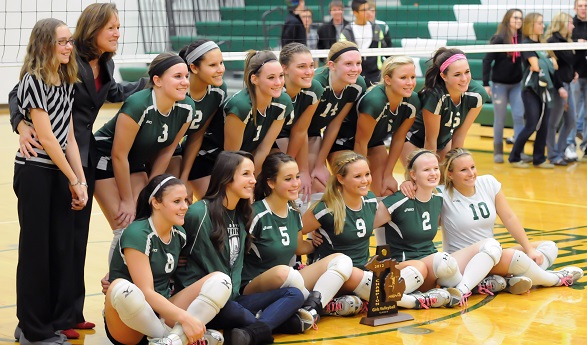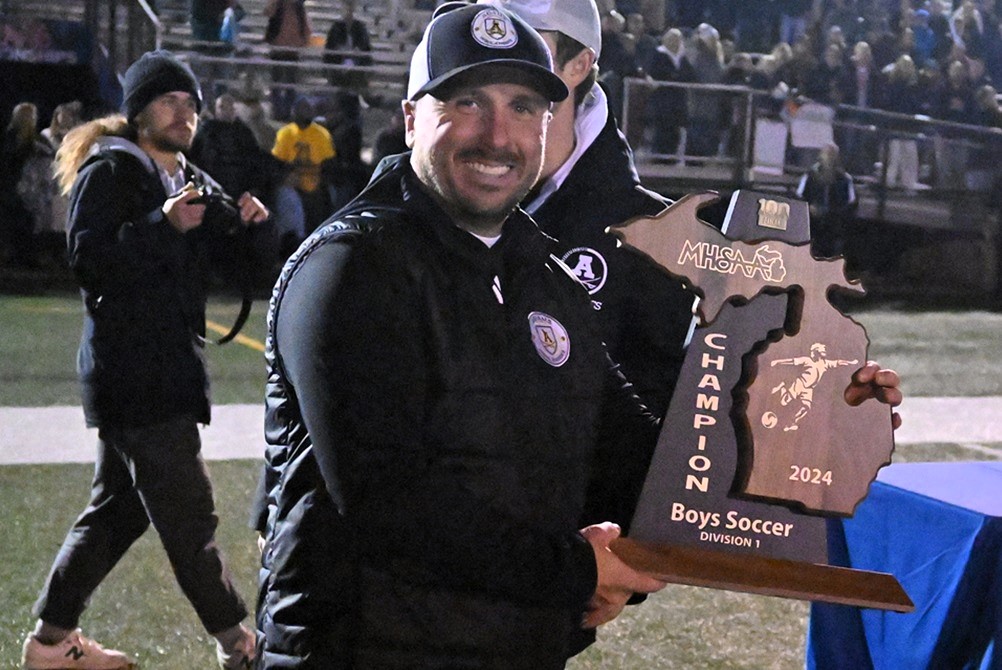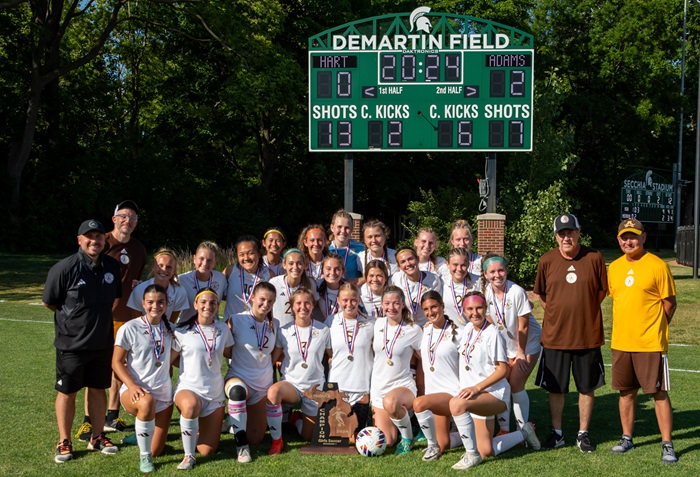
Wise Words for Coaches New (and Old)
September 13, 2013
By Geoff Kimmerly
Second Half editor
Every fall brings a new beginning for those who live by the high school calendar. And among those experiencing a new start are first-year high school coaches eager to begin their careers in educational athletics.
But what knowledge do they bring into their first coaching jobs? Most if not all played at the high school level, and many played at the college level as well. Some have served as assistants or coached youth teams. But high school coaching comes with its own set of challenges requiring an advanced set of skills – skills that are passed on annually as part of the Michigan High School Athletic Association’s Coaches Advancement Program.
To assist in giving some of our new coaches a running start, we tapped into the knowledge of three of our Coaches Advancement Program instructors for advice they give those just starting out:
 Jean LaClair began this fall 12th in MHSAA volleyball history with 861 wins since becoming a varsity head coach in 1987. She’s coached at Midland Dow, Pinconning and currently Bronson, where she’s also the athletic director and an assistant principal. She’s also served as an MHSAA official and contributed to the Women in Sports Leadership porgram.
Jean LaClair began this fall 12th in MHSAA volleyball history with 861 wins since becoming a varsity head coach in 1987. She’s coached at Midland Dow, Pinconning and currently Bronson, where she’s also the athletic director and an assistant principal. She’s also served as an MHSAA official and contributed to the Women in Sports Leadership porgram.
 Ken Semelsberger is a recent inductee into the Michigan High School Football Coaches Hall of Fame and spent 33 years at Port Huron High School as a coach and athletic administrator. He also coached football at Detroit Servite and has led teams in basketball, softball and baseball. Semelsberger returned to the Port Huron sideline four seasons ago as the varsity’s line coach.
Ken Semelsberger is a recent inductee into the Michigan High School Football Coaches Hall of Fame and spent 33 years at Port Huron High School as a coach and athletic administrator. He also coached football at Detroit Servite and has led teams in basketball, softball and baseball. Semelsberger returned to the Port Huron sideline four seasons ago as the varsity’s line coach.
 Penny Allen-Cook currently is an athletic consultant and in her fourth season coaching the Freeland varsity volleyball team. She also coached volleyball at Alma College, and is a former assistant commissioner of the Great Lakes Intercollegiate Athletic Conference. She served as an assistant athletic director at Alma College and director of compliance at Saginaw Valley State University.
Penny Allen-Cook currently is an athletic consultant and in her fourth season coaching the Freeland varsity volleyball team. She also coached volleyball at Alma College, and is a former assistant commissioner of the Great Lakes Intercollegiate Athletic Conference. She served as an assistant athletic director at Alma College and director of compliance at Saginaw Valley State University.
All were asked the following questions during separate interviews. But not surprisingly, some of their answers were similar – especially those that emphasized dealing with parental pressures and why they as coaches continue to return to the sideline every year.
Many of their answers also segued well into each other, so we’ve blended them for one longer conversation filled with wisdom beneficial to new and veteran coaches alike.
What do you tell those who are interested in becoming high school coaches?
Semelsberger: “Basically, it’s one of the most fulfilling things you’ll ever do. And it’s also one of the hardest things you’ll ever do. I try to explain that it’s not just about going to practice and coaching kids today. That’s the easy part. It’s also preparing for practice, (gaining) the knowledge of what to do in certain situations from the game itself all the way to training procedures, injury procedures and liability issues. That’s all part of the coaching realm.”
LaClair: “My biggest concern with young coaches is them getting driven out by parents really early. You’ve got to have thick skin, and you’ve got to have great relationships with parents. You can’t be afraid to talk to parents.”
Allen-Cook: “Certainly to coach is an extremely rewarding thing to do. But you can’t get into it for the money. You get into it for the things that last for a lifetime. My first year I started coaching was back in 1986, and I’ve kept in touch with those kids. (Coaching) can’t be for money or wins and losses, but the differences you make in lives.”
Semelsberger: “Probably not until after the first year do you realize all that’s entailed in coaching. (Coaches) say, ‘Once I really got into and do it, after the first time, it was a lot more than I thought.’ They say, 'What can you tell me to help me?'”
How do you encourage coaches who have become frustrated with the profession?
Allen-Cook: “It’s easier to get discouraged nowadays more than it used to be, and a common thing that discourages is the parent involvement is at a different level than it ever was 20 years ago. The key is to remember, and it’s hard for young coaches who aren't parents, but you tell them to step back and imagine what it feels like if you were the parent.”
LaClair: “I do try to get all young coaches a mentor, someone to talk with. We all get frustrated; we all have to vent, and we need the right person to talk it through with and come up with alternative ways (of dealing with situations).”
Semelsberger: “The one thing I tell them is to remember that what’s most important out there is how they influence athletes. I want to see them doing positive things with our athletes, stressing grades and sportsmanship. I hired a hockey coach once, and I told him to clean up the program. I don’t care if you win; I want our grades to be good, community involvement, and the wins and losses will come. If you stay with it, hang in there, it will come.”
Allen-Cook: “If they approach things the right way, in as few years as four or five, if they stick it out, they’ll learn the positives outweigh the negatives. I’m always encouraging them to stick it out a few more years until they can figure out their true philosophy, why they want to coach.”
What specific situations do you tell new coaches to prepare for, and how?
LaClair: “For me as a coach, the parent/athlete meeting is mandatory. If a parent comes to me with a question during the year, I say, ‘Do you remember the parent/athlete meeting? We discussed that.’ It sets the tone and tells parents how proactive you are as a person, how organized and prepared you are.”
Semelsberger: “When you’re not coaching, when you’re sitting in the stands, the parents are friendly. But once you’re on the sideline, now you’re the coach, and that changes the dynamic of the relationship dramatically. I explain to (coaches) that my philosophy is I’m dealing with parents’ most precious item. You want to treat each one of those children like you’d want your kids to be treated. You don’t have to play everyone all the time, but treat (athletes) with respect, talk to them and let them know what’s going on, why a kid isn't playing, so the kid has an idea what’s going on.”
Allen-Cook: “One of the best defenses is to be a student of whatever the game is they’re coaching so they can be seen as an expert all the time. Show it by going to clinics, reading up on things, and coming to practice with a true plan of what you’re doing every day. Parents are less likely to question if you know what you’re doing and they can see you’re a true student of the game and come every day prepared.”
LaClair: “Time management is critical. Especially for me, you need to have good practice plans, well thought out in advance so kids aren't standing around at all.”
Semelsberger: “Sometimes I tell (coaches) about reporters if the sport has a lot of reporters; always be positive, don’t be negative. ... (Also) I make sure they understand and follow the rules. Academics are the most important thing, so make sure every kid is eligible. And I tell them the most important people are secretaries and custodians. Get them on your side, and they’ll do anything for you.”
What advice do you offer coaches who also are balancing teaching or other jobs at the school?
LaClair: “Just over half of my (teachers are coaches), and that’s great. You can build a different type of relationship.”
Semelsberger: “Their number one job is being a teacher, and that’s always been the number one job. They can’t let the fact they coach take away from that. Classes are number one, and coaching comes after that.”
LaClair: “You have to think days and weeks ahead. I tell coaches who are also teachers that the weekends and a lot of Sundays are going to be for making lesson plans for the week, practice plans for the week. Then all they have to do is tweak them. Have a good plan and all you have to do is tweak, and you don’t have to do that for two hours on a Thursday night.”
Allen-Cook: “It’s a neat experience to be able to teach in other realms (like athletics). Unfortunately there are less and less teacher coaches.”
What keeps you coming back to coaching?
LaClair: “The kids. A lot of people think social media is an evil beast, and it can be. But what I love about it is I've been coaching a long time and I can keep up with former athletes all over the country, see baby pictures, things I wouldn't be able to do without social media.”
Allen-Cook: “I think once you’re a coach, you’re always a coach. It’s tough to get out of your blood. I enjoy the interaction with the young people. I’m an independent contractor now (Allen-Cook also has taught) so I have little interaction with student athletes anymore. It feels rewarding that in some way I’m having a positive impact.”
Semelsberger: “The kids, the athletes, just to watch them develop as human beings. We work hard with on our athletes being leaders in the (school) building; the first day of school our senior and junior football players were helping out the freshmen. If a kid was scared or something, trying to get where they needed to go, we had jerseys on and they knew if they saw a kid with a jersey on they could ask for help. To see those kids take on those roles ... I love watching the ninth graders come in as scared little kids and watch them leave as confident seniors going on to college or work or whatever they’ll do.”

PHOTOS: (Top) Penny Allen-Cook (second from left, back row) and her Freeland volleyball team celebrate last season's Class B District championship. (Click to see more from High School Sports Scene.) (Below) Bronson volleyball coach Jean LaClair speaks with some her players during one of her more than 1,000 games as a varsity head coach. (Photo courtesy of the Sturgis Journal.)

Hickey Joins Notable Coaching Crew as Adams Completes 2024 Soccer Sweep
By
Keith Dunlap
Special for MHSAA.com
November 14, 2024
When New Year’s Eve comes this year and the ball drops to welcome in 2025, Rochester Adams boys and girls soccer coach Josh Hickey might be hesitant to celebrate this year coming to an end.
 It’s not that he won’t be excited for the new year. It’s just that it might be impossible to top 2024 from a coaching perspective.
It’s not that he won’t be excited for the new year. It’s just that it might be impossible to top 2024 from a coaching perspective.
In June, Hickey made history when he helped guide the Adams girls to the Division 1 championship with a 2-0 win over Hartland.
He joined the list of soccer coaches in state history who have led both boys and girls programs to Finals championships, a group that includes Barry Brodsky of Bloomfield Hills Marian/Brother Rice, Randy Heethuis of Hudsonville Unity Christian, Brian Guggemos of Okemos, Ken Johnson of Salem, Brian O’Leary of Novi, Tim Storch of Troy Athens and Clark Udell of Grand Rapids Forest Hills Central.
“That’s good company to keep, that’s for sure,” Hickey said in praising those other coaches who have pulled off the feat.
Earlier this month, the Adams boys followed in the footsteps of their classmates from this spring, defeating Byron Center in the Division 1 Final, 2-0, to win the program’s second Division 1 title over the last three years. Adams downed Rockford in the 2022 Final, also by a 2-0 score.
Adams also won girls and boys Division 1 soccer titles during the same calendar year in 1999, but with those teams led by separate coaches.
Hickey said while each team had talent and players all came from great soccer backgrounds and families, the two championship runs were quite different.
“With the girls, I would imagine nobody picked us necessarily to go that far, especially at the beginning of the season,” he said. “Throughout the year, the girls were just super resilient. The expectation wasn’t there.”
It was a far different element once the fall started and the boys took the field, given there was a solid core of returnees and also five MLS Next academy players who decided to experience high school soccer for their senior year, including eventual Mr. Soccer Award winner Alex Rosin.
 “With the boys, we had to battle through all those expectations,” Hickey said. “There is something with your mental toughness to see if the kids can even handle that pressure. They handled it better than I thought they would. It was never a concern or issue.
“With the boys, we had to battle through all those expectations,” Hickey said. “There is something with your mental toughness to see if the kids can even handle that pressure. They handled it better than I thought they would. It was never a concern or issue.
“The girls came in and just wanted a good year and then ended up having the most success they could ever imagine. The boys came in telling me they wanted to win the whole thing from day one.”
On Oct. 30 – when the Adams boys team defeated Saline in their Semifinal (2-1 in penalty kicks) – it just so happened to be the same day the girls team got its championship rings.
“Some of the girls came and showed us during lunch and throughout the day,” Rosin said. “It just gave us extra motivation. We had to win two more, and we successfully did. At the time, we wanted it so bad and we saw them wear the rings at school. It made us want it even more.”
For the record, Rosin said playing high school soccer — even if it was just for one year — was an experience he’ll never forget.
“Hickey played me at every position,” Rosin said. “It was a good experience to learn the game in a different way. Just kind of push myself and test myself every day. Different positions and trying to become the best player I can be.
“One thing I’ll take away is the memories and new bonds I made with my teammates. It was something incredible.”
Despite the boys season being over, Hickey said the transition to girls season will wait a bit. There is still the matter of the postseason banquet to attend to, as well as championship celebrations such as meeting the mayor of Rochester Hills and marching in the downtown Rochester Christmas parade.
But once the celebrations slow down and the holidays come to end, all attention will turn to the girls season and the run for a repeat next spring.
The Adams girls program has never won consecutive Finals titles, but should be well-equipped to give it a go.
“A lot of players come back from the starting group,” Hickey said. “We also had girls waiting in the wings waiting to play. We’re excited for it.”
While it will be difficult for Hickey and Adams soccer to say farewell to 2024, there clearly is a lot to look forward to for 2025 as well.
 Keith Dunlap has served in Detroit-area sports media for more than two decades, including as a sportswriter at the Oakland Press from 2001-16 primarily covering high school sports but also college and professional teams. His bylines also have appeared in USA Today, the Washington Post, the Detroit Free Press, the Houston Chronicle and the Boston Globe. He served as the administrator for the Oakland Activities Association’s website from 2017-2020. Contact him at [email protected] with story ideas for Oakland, Macomb and Wayne counties.
Keith Dunlap has served in Detroit-area sports media for more than two decades, including as a sportswriter at the Oakland Press from 2001-16 primarily covering high school sports but also college and professional teams. His bylines also have appeared in USA Today, the Washington Post, the Detroit Free Press, the Houston Chronicle and the Boston Globe. He served as the administrator for the Oakland Activities Association’s website from 2017-2020. Contact him at [email protected] with story ideas for Oakland, Macomb and Wayne counties.
PHOTOS (Top) Rochester Adams soccer coach Josh Hickey shows the Division 1 championship trophy after his boys team defeated Byron Center on Nov. 2 at Grand Ledge High School. (Middle) Hickey, far left, takes his spot in the team photo after Adams’ girls won the Division 1 title in June at Michigan State’s DeMartin Stadium.

